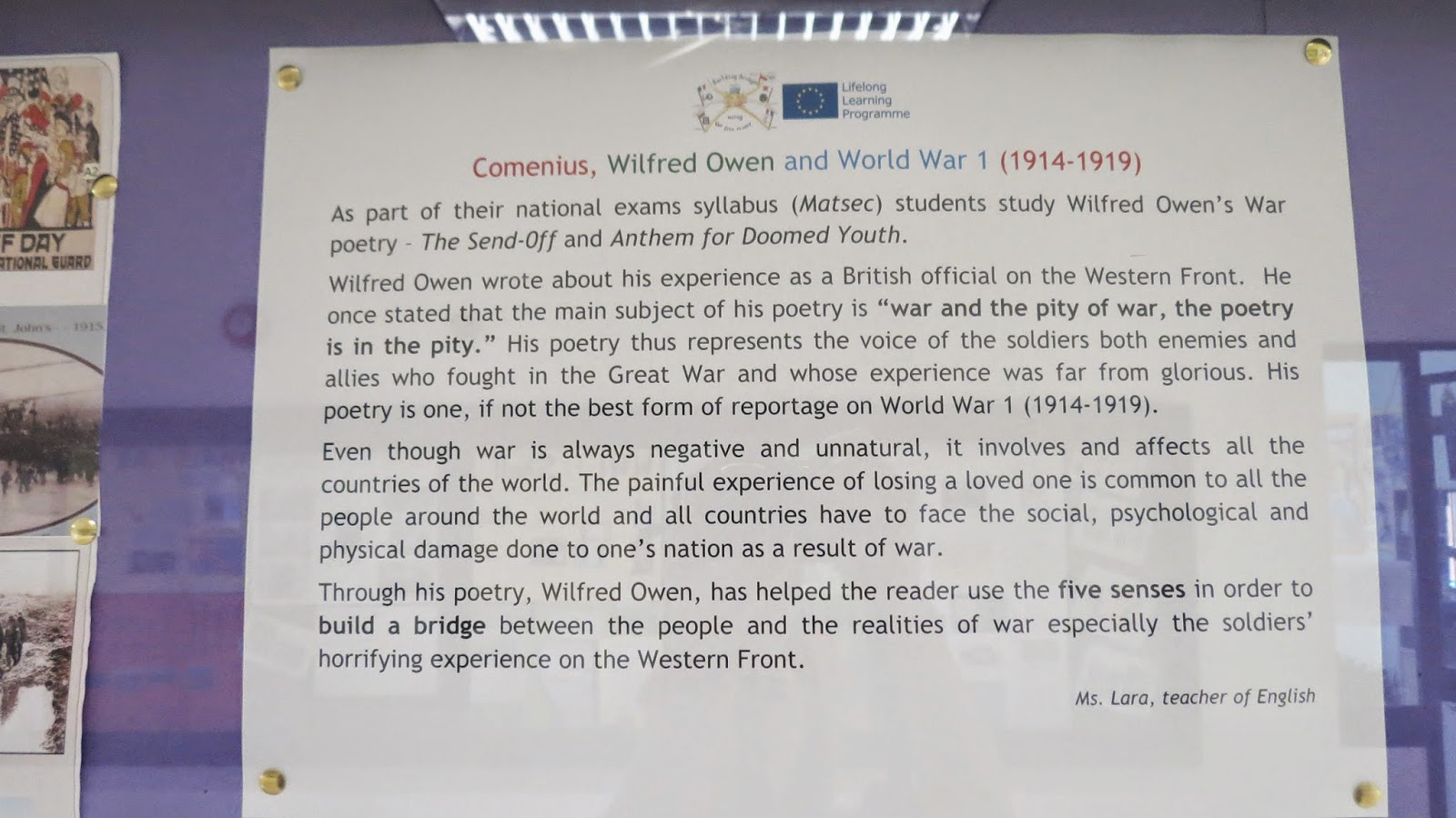Some of the Grade 12s have compiled a short project about certain aspects of Maltese life-style about 200 years ago. Students have focused on elements such as methods of transport, typical games played by the children, and leisure time. One must remember that at time Malta was a British colony so many British elements may be found, but the Maltese identity was never lost. A very good example of this was when a British company ran the only train we have ever had and the locals referred to it as 'il-vapur tal-art'. There is no real word in Maltese for a train, and the literal translation of how the Maltese referred to it is the boat of the land.
Sunday, 6 April 2014
Sneak Peak to the Guidebook
As part of this Comenius Project, students were asked to document their county's development through photos and gather information about their respective regions. All of the information was then compiled as a guidebook. The main aim of this guidebook is in fact to pass on a message: we are who we are and we have what we have thanks to our ancestors, their hard work, the tough life they lead, and the battles they fought. Showing appreciation and be thankful for all this is the minimum that one could do to honour them.
Friday, 4 April 2014
Organic Farms and their Implementation in the Maltese Islands.
Since the start of the Green Revolution,
a series of developments into agricultural production, the mean crop yield shot
up exponentially, virtually annihilating hunger in the developed world and
saving thousands of lives in the developing one. However, this also led to
increased use of synthetic fertilizers, herbicides and pesticides, which
contributed to not only the increased rates of cancer in those that eat such
crops, but also to the pollution of water reservoirs, causing the death of the
local fish population living there and, in turn, the destabilization and
possible eradication of the ecosystem the reservoir supported. Because of this,
more and more people began to show concern for the environment, leading to an
increase of interest in the Organic Movement, which proposed methods
alternative to the ones used in the mass production of crops seen in the
1960’s, preferring such ways as using insects as natural pesticides and manure
as fertilizer, thus drastically reducing not only the risk to the environment,
but also a risk to human health.
While the European Union encourages
organic farming in its member countries, this trend hasn’t developed much in
Malta, where only 23 hectares being used organically. Now, however, schools are
increasingly raising awareness on the matter, a prime example being the
Geography trip that was undertaken by the Grade 10 Geography students (myself
included) to the Manikata valley, where a group of farmers banded together to
form the Koperattiva Rurali Manikata,
a cooperative whose mission is to “to safeguard rural life and traditions in
the area around Manikata, especially farming, animal husbandry, the keeping of
bees,… to contribute to the protection of the natural environment in the
locality;” . We were escorted to a one such farm by the guide, a representative
of the cooperative. On the way, she explained how, due to the farms being
located at the bottom of the valley, the farmers enjoy the most fertile of
soils found on the islands, as water erodes the soils found on the slopes down,
giving the farmers a constant supply of soil. When we arrived, we were given
information on how exactly a farmer can try to be organic and how he can encourage
plant growth. One way is to use natural fertilizers, such as green manure,
which is made of dried up leaves of plants from the legume family, such as the
peas or beans. Another practice that is commonly used is crop rotation, which
is when a farmer divides his field into four, three pieces of the land being
planted with different types of crops, while the fourth piece is left unused,
with the farmer switching the field use every year. This helped the soil to
retain its nutrients, meaning that the need for fertilizers would be less.
Farmers also use natural products (usually a mixture of water, garlic and
chili) as rodent repellent, which not only doesn’t harm the pests, but also has
no negative consequences on the plants. Another interesting way to keep out
pests, this time bugs, was explained to be winding the wool from sheep around
the trunk of a tree, thus not allowing the bugs to get to the fruit.
All in all, it is safe to assume that
organic farming is a viable alternative to traditional farming in Malta, as it
not only protects the environment and the species living in it, a growing issue
due to the rapid urbanization of the island, but also produces crops of a
higher quality and ones that contribute much less or even not at all to health
problems in those that consume them. And while it may take some time, the
growing awareness of this matter may mean, and I personally hope, that Malta
will see an increase in such beneficial practices.
Wednesday, 2 April 2014
Subscribe to:
Comments (Atom)































